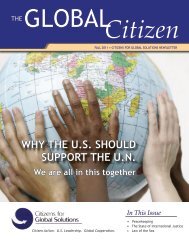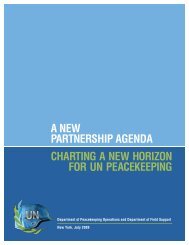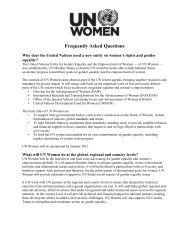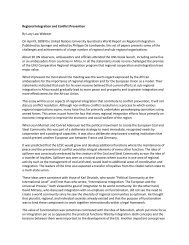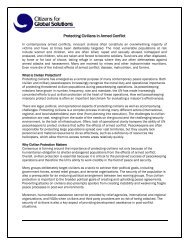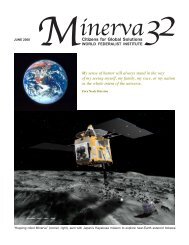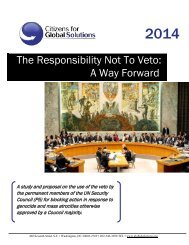Minerva, Fall 2011 - Citizens for Global Solutions
Minerva, Fall 2011 - Citizens for Global Solutions
Minerva, Fall 2011 - Citizens for Global Solutions
- No tags were found...
Create successful ePaper yourself
Turn your PDF publications into a flip-book with our unique Google optimized e-Paper software.
the ef<strong>for</strong>ts to achieve the MDGs. We willhave an estimated 1.4 billion people livingin slums in 2015. We are not dealingwith ‘minority’ groups here. Millions ofhomeless and landless people cannot be aminority. They can’t be left out. A holistichuman rights perspective must spur discussiontowards a new socially inspiredeconomic and political world order as theonly way to overcome poverty, hungerand disease and sustain common life onthis resource-limited planet. Such an immensetask will call <strong>for</strong> collective actionwell beyond 2015.”Phyllis Bennis, a Fellow of the Institute <strong>for</strong>Policy Studies and the Transnational Institutein Amsterdam, argues that, insteadof searching <strong>for</strong> new strategies to achievethe Millennium Goals, the MDGs shouldbe re-construed as MDRs — MillenniumDevelopment Rights (YES! Magazine,27 September 2010). Then grim realitiescould be changed “through building anew internationalist movement, involvingcivil society AND governments AND theUnited Nations. And a movement basedon rights — with accountability whenthose rights are violated.”12 - Don Kraus, “The Arab Spring and a<strong>Global</strong> 911”, guest post on care2make adifference, 16 May <strong>2011</strong>13 - Don Kraus, The <strong>Global</strong> Citizen blog, 18 April <strong>2011</strong>14 - “With these guidelines,” assertsWalden Bello, referring to perspectivesattributed to the <strong>Global</strong> South, “very fewhumanitarian interventions would havequalified as valid and carried out legitimatelyin the last 40 years. There are perhapsonly two: the Vietnamese invasionto remove the blood-thirsty Khmer Rougefrom power in 1978 (though this lackedUN sanction) and the UN-led multinational<strong>for</strong>ce INTERFET that ended thegenocidal killings and deportations ofTimorese by Indonesian-backed militiasin 1999.”15 - Rachel Gerber, “The Trials and TestsFaced by R2P”, The Stanley Foundation’sthink., August <strong>2011</strong>; reprinted here, page4016 - Rachel Gerber, “Mass Atrocities andthe International Community: The MultilateralFramework <strong>for</strong> Prevention and Response”,The Stanley Foundation’s think.,April <strong>2011</strong>17 - For example: the work of the UNbackedInternational Commission AgainstImpunity in Guatemala (CICIG). Createdin the fall of 2007, the CICIG is describedby David Grann (“A Murder Foretold —Unravelling the ultimate political conspiracy”,The New Yorker, 4 April <strong>2011</strong>)as “a path-breaking political experiment.Unlike many truth commissions or humanrights bodies, it does not investigatewar crimes of the past, or merely monitorabuses. Rather, it aggressively fightsagainst systemic violence and corruption…. Composed of several dozen judges,prosecutors, and law-en<strong>for</strong>cement officialsfrom around the world, CICIGworks within Guatemala’s legal systemto prosecute members of organized crimeand dismantle clandestine networks embeddedin the state.”Thanks to national and international pressure,the Guatemalan Congress approvedthe International Commission AgainstImpunity in Guatemala on 1 August 2007.The CICIG is set up to support the PublicProsecutor’s Office, suggesting methodsof investigation and presenting evidence.The Public Prosecutor’s Office has ultimateresponsibility <strong>for</strong> deciding whetheror not to pursue an investigation. It is partlyintended to interrupt the operations ofclandestine groups that undermine respect<strong>for</strong> the rule of law and human rights.8 • <strong>Minerva</strong> #39 • November <strong>2011</strong>In a recent high-level case (Amnesty Internationalpress release, 26 November2010), the Guatemalan Public Prosecutor’sOffice brought charges against <strong>for</strong>merInterior Minister Carlos Vielman“and 19 individuals, some of whom arein custody, <strong>for</strong> their alleged participationin the extrajudicial execution of prisonersin several Guatemalan jails. These actionshave the support of the CICIG. FormerNational Director of Police Erwin Sperisen,currently resident in Switzerland, andother <strong>for</strong>mer officials are being investigatedover the killings of prisoners heldat two prisons in Guatemala in 2005 and2006.” Carlos Vielman was arrested on13 October in Madrid following a judicialrequest by the Guatemalan Public Prosecutor’sOffice, supported by the CICIG.He was released by the Spanish authoritieson 23 November, after Guatemalafailed to meet a deadline <strong>for</strong> filing theproper documentation <strong>for</strong> his extradition.18 - Don Kraus, care2make a difference,16 May <strong>2011</strong>: “In the meantime the USshould support the deployment of UNpeacekeepers on the ground to protectcivilians; provision of food, water, medicineand shelter <strong>for</strong> displaced Libyans;and UN sponsored elections to bring democracyand a legitimate government.”19 - Nicholas Kristof, New York Times, 7September and 31 August <strong>2011</strong>20 - Bill McKibben, Reader SupportedNews, 16 April <strong>2011</strong>: “Climate change,above all issues, requires a trans<strong>for</strong>mativeand not an incremental vision. We havefundamental change to make, and a veryshort window to make it in — Obama’stypical (and often quite savvy) little-bitat-a-timeapproach doesn’t square withthe physics and chemistry that govern thisdebate.”21 - Naím and Stern, along with severalother debaters on this issue, are quoted byThanassis Cambanis, author of A Privilegeto Die: Inside Hezbollah’s Legionsand Their Endless War Against Israel, in“No Big Deal — The key to solving theplanet’s most daunting problems: thinksmall”, Boston Globe, 9 January <strong>2011</strong>.22 - Peter Baldwin, “The Narcissism ofMinor Differences: How America andEurope Are Alike”, New York Times, 28November 201023 - Christopher Hayes, of The Nation,“In Search of Solidarity”, In These Times,3 February 200624 - Editor & artist J.A. Myerson, “‘ArabSpring’ Label Hampers <strong>Global</strong> Protests’Solidarity Potential”, Truthout, 9 July<strong>2011</strong>25 - “For a team to be lovable, it helpsnot to be great or too great, but rather tohave a chance to win or get lucky,” saysLawrence Wenner, of Loyola MarymountUniversity, author of the MediaSport and<strong>for</strong>mer editor of the Journal of Sport andSocial Issues (quoted in 26, below).26 - Leon Neyfakh, “How Teams TakeOver Your Mind”, Boston Globe, 24 April<strong>2011</strong>; see also: Sports and Their Fans, by



